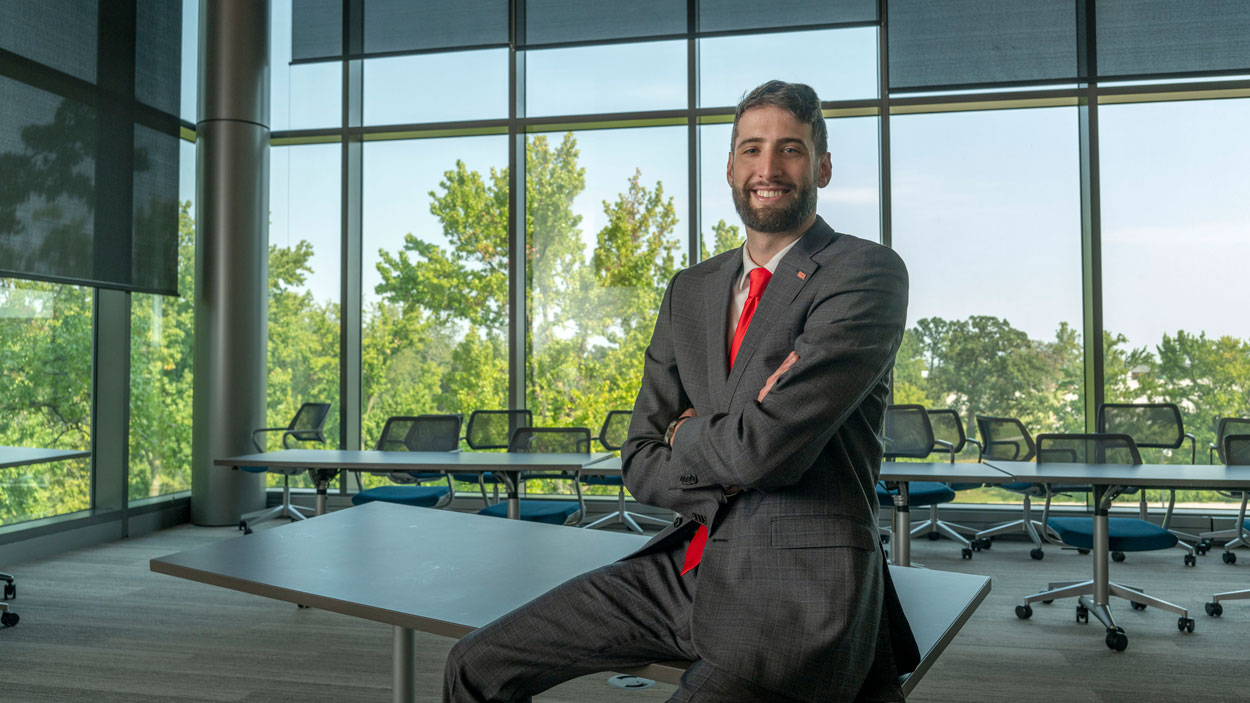
Dan Grossman, an assistant professor of marketing, has long been fascinated with the psychology behind how people respond to invitations. (Photo by Derik Holtmann)
Dan Grossman, an assistant professor of marketing at the University of Missouri–St. Louis, has remained close with many of the friends he grew up with in Buffalo, New York. The group has regularly met up for trips and get-togethers over the years, everything from going to a baseball game to taking a bigger trip to the North Carolina mountains.
The process of planning those excursions has often been a struggle, though, and that struggle was the genesis of a recent research paper published by Grossman and three of his colleagues.
“Everyone wanted to get together, but no one wanted to organize anything, so I ended up becoming the one who would try to rally everyone to go on a trip,” Grossman said. “I wondered, ‘Why does no one else step up to do it?’ When I started organizing the get-togethers, I realized it’s because when I’d send those texts out – our friend group is probably 10 people – I would get back ‘Maybe,’ ‘Maybe,’ ‘Maybe,’ ‘Maybe.’ It was the worst. Eventually I would have to say, ‘I need a yes or no.’ It just bothered me to no end that people thought ‘maybe’ was an adequate response.”
A researcher at heart who has extensively studied how motivations impact consumer behavior, Grossman, who won the Chancellor’s Award for Sustained Excellence in Online Teaching in 2024, needed to understand the psychology behind why his friends would reply that way. He understood, of course, that their non-committal responses were not unique to the group. It’s something almost everyone deals with on a regular basis.
“Say you get two free Cardinal tickets from work for the upcoming weekend, and you text your friend, ‘Hey, you want to join?’” he said. “But when you get a ‘maybe’ back, just like that, the excitement for the game kind of fades. Instead of feeling pumped, excited and hyped, you’re just left hanging. You can’t make plans until your friend ultimately decides what they want to do.”
Grossman reached out with the research idea to his longtime friend, Julian Givi, an associate professor of marketing at West Virginia University. He responded with a definitive “yes,” and a plan was devised. They enlisted collaborators Colleen Kirk, a professor of management and marketing at New York Institute of Technology, and Constantine Sedikides, a professor in the psychology department at the University of Southampton in the United Kingdom. The group, which this spring published its research on self-invitation hesitation, got to work.
The paper, titled “Maybe don’t say ‘maybe:’ How and why invitees fail to realize that they should not respond to invitations with a ‘maybe’” is being published in the November issue of the Journal of Experimental Social Psychology. Givi has also written about the research in multiple publications, including an article in the Wall Street Journal that published in early October.
The researchers ran six experiments employing more than a thousand participants, with the participants given different roles. In each scenario – for example, if the invitee wasn’t sure if they could attend or if they weren’t sure if they wanted to attend – the inviters were asked whether they would prefer a “maybe” or a “no” answer. The invitees were asked if they thought the inviter would prefer a “maybe” or a “no.”
The answers showed a pretty clear gap.
“We consistently found that people overestimate an inviter’s likelihood of preferring a ‘maybe’ to a ‘no,’” Grossman said. “So it’s not only that they’re going to decide to say ‘maybe,’ but they’re actually overestimating how much that inviter would prefer them to say ‘maybe’ instead of saying ‘no.’ They miss out on just how disrespected people feel when they get a response that’s a maybe to their invitation.”
That disrespect stems, at least partially, from the inferred meaning of the ‘maybe’ answer, which is that the invitee doesn’t want to commit because they want to keep their options open. It also means the inviter has to put planning on hold, leading to frustration. Even though replying “maybe” wasn’t necessarily coming from a place of truly selfish motivation in that they wanted to inconvenience the inviter – it was more about being unaware of the impact of their non-committal answer – that answer is, in fact, very selfish in nature.
The group wanted to figure out why the invitee would think the inviter would prefer “maybe.”
“After doing some digging into it, we found it’s largely due to something called motivated reasoning,” Grossman said. “Motivated reasoning is a cognitive bias where people interpret information in a way that supports a preexisting belief or a desired outcome.”
The research group targeted the motivated reasoning element by adjusting scenarios. For example, they asked invitees whether they thought the inviter would prefer “maybe” or “no” to an invite to their favorite restaurant, and they also asked the same question, but to a restaurant serving food the invitee didn’t like. In the second scenario, the “no” responses were much higher.
“Part of our core finding is that simply saying ‘maybe’ is better for the person given the invitation for a variety of reasons,” Grossman said, “whether it’s avoiding the fear of missing out, or leaving options open or whatever, and as such they can convince themselves that’s what inviters want to hear.”
Through his research, Grossman has another theory on why “maybe” is so prevalent.
“As human beings, we learn a lot of our behaviors from rewards and punishments, all the way from childhood to adulthood, and it’s how we continue to learn,” he said. “But the issue with saying ‘maybe’ is that people don’t get really that punishment. It’s rare for someone to get actually upset or say something like, ‘Hey, don’t do that.’ So they live their whole life thinking it’s OK. So it’s not always being selfish, but more ill-informed.”














